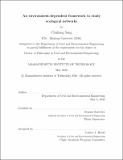An environment-dependent framework to study ecological networks
Author(s)
Song, Chuliang.
Download1192461962-MIT.pdf (37.20Mb)
Other Contributors
Massachusetts Institute of Technology. Department of Civil and Environmental Engineering.
Advisor
Serguei Saavedra.
Terms of use
Metadata
Show full item recordAbstract
Species interactions are central for the persistence of almost every form of life on Earth. Ecological networks provide an integrated representation of how species interactions are organized within ecological communities. Importantly, ecological networks are highly structured, which has motivated generations of ecologists to elucidate how these structures affect species coexistence. Unfortunately, we still do not have a clear and consistent answer about the link between network structure and species coexistence. Yet, solving this puzzle can provide key insights regarding the maintenance of biodiversity and ecosystem services. Interestingly, despite the extensive empirical evidence supporting that the environment affects both network structure and species coexistence, most of the studies do not take into account the conditional effects of the environment on these two variables. Indeed, due to the multidimensional and changing nature of environmental factors, it has not been easy to develop a general framework that can link the structure of ecological networks, species coexistence, and the environment. In this thesis, I establish a scale-dependent, rigorous, testable framework to understand how ecological networks affect species coexistence within an environmental context. In the first part of the thesis, I develop a theoretical framework and computational tools, rooted in the notion of structural stability, to quantitatively link network structure, species coexistence, and environmental factors. In the second part of the thesis, I test and validate this theory using field and experimental observations of plant-pollinator, annual-perennial plant, and plant-herbivore interaction networks. In specific, I show how spatio-temporal variability of the environment affects the structure of ecological networks, and how they jointly drive the patterns of species coexistence that we observe in nature. Overall, my thesis establishes that the structure of ecological networks may only make sense in the light of environmental information.
Description
Thesis: Ph. D., Massachusetts Institute of Technology, Department of Civil and Environmental Engineering, May, 2020 Cataloged from the official PDF of thesis. Includes bibliographical references (pages 271-296).
Date issued
2020Department
Massachusetts Institute of Technology. Department of Civil and Environmental EngineeringPublisher
Massachusetts Institute of Technology
Keywords
Civil and Environmental Engineering.